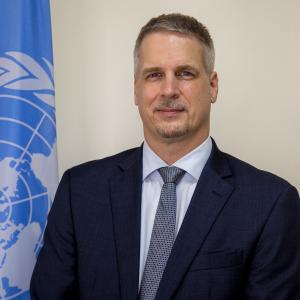UNRC Remarks for Fiji National Voluntary Review Launch
UNRC Remarks for Fiji National Volunteer Launch
It is an honor and a privilege to stand before you on United Nations Day and on behalf of the UN family to extend our warmest congratulations to Fiji on the launch of its second Voluntary National Review.
The Review was presented this year in July in New York at the UN High-Level Political Forum by Assistant Minister for Foreign Affairs Hon. Lenora Qereqeretabua.
Fiji’s commitment to the pursuit of the Sustainable Development Goals is indeed commendable, and this second Voluntary National Review serves as a testament to this.
As we find ourselves at the midpoint of the 2030 Agenda, Fiji's Voluntary National Review embodies the true spirit of the VNR process. It provided an inclusive and country-led review of progress at both national and sub-national levels, showcasing the importance of a country-led approach.
Please, allow me to commend the Government of Fiji for its efforts to enhance data access and availability, which is crucial for accurately measuring progress towards the SDGs.
Equally commendable are the wide-ranging consultations that Fiji conducted with civil society organizations, development partners, private sector and academia. Their invaluable contributions are instrumental in advancing the SDGs.
The Voluntary National Review serves as a strong reference point to help us reorient and accelerate Fiji’s development pathway over the next seven years. It is heartening to witness Fiji's journey from its first VNR in 2019 to this second review.
Significant progress has been achieved, particularly regarding SDG 4 on inclusive and equitable quality education for all; SDG 5 on gender equality and women’s empowerment; SDG 6 on clean water and sanitation, SDG 11 on sustainable cities and communities, and SDG 13 that focuses on urgent action to combat climate change and its impacts.
In recent years, Fiji has faced global challenges, including the COVID-19 pandemic, supply chain disruptions, economic recession, and political crises. These challenges have adversely affected progress towards several other SDGs, particularly ending poverty (SDG 1); food security (SDG 2), good health and well-being (SDG 3), decent work and sustainable economic growth (SDG 8) and reducing inequalities (SDG 10).
We see very uneven progress towards achieving the SDGs and their targets in Fiji. Out of the 169 SDG targets, Fiji has made good progress in achieving 24 (14%) of them. Another 45 (27%) targets could be achieved, but this would necessitate accelerated action. Regrettably, negative progress has been observed in 28 (17%) of the targets, while 72 (43%) targets could not be measured which is of course of concern.
Among the key challenges and opportunities highlighted in the VNR, the "triple threat" facing the Fijian economy, including high levels of debt, delayed infrastructure development, and recurrent climate change shocks, is paramount.
We commend the steps that the Government of Fiji has already taken to address these challenges, including the development of the Fiji Medium-Term Fiscal Strategy in February 2023 and the fiscal consolidation plan to ensure debt sustainability.
The United Nations stands fully committed to supporting the Government of Fiji on its journey towards achieving the SDGs. Our new United Nations Pacific Sustainable Development Cooperation Framework and the Fiji Country Implementation Plan are designed to work under four principal pillars, all of which are interconnected with the achievement of the SDGs.
The Prosperity Pillar aims to support all Fijians, particularly those at risk of being left behind, in contributing to and benefiting from sustainable, resilient, diversified, and inclusive socio-economic systems. In responding to the ‘triple threat’ facing the Fiji economy, it seeks to provide decent work and equal livelihood opportunities for all, with a focus on transitioning towards a low-carbon blue/green economy, improving agri-food systems, and bridging the digital divide.
The VNR highlights the need for coordinated conservation and improved regulation of fisheries to develop marine-based activities, and the UN’s Planet Pillar responds to this by focusing on protecting, managing, and restoring ecosystems and biodiversity and building community resilience to climate and environmental impact.
The UN’s People Pillar is dedicated to ensuring all Fijians, especially those at risk of being left behind, benefit from equitable access to resilient, quality, and gender-responsive basic services, food security, and nutrition. UN agencies are committed to strengthening social protection mechanisms, inclusive public health systems, food security, and nutrition, with a particular focus on identifying and targeting the most vulnerable, including women and children.
The UN’s Peace Pillar aims to supporting Fiji in developing more accountable, inclusive, resilient, and responsive governance systems. It seeks to promote gender equality, climate security, justice, and human rights, while ensuring participation and the protection of human rights.
On this United Nations Day, we are reminded of the importance of global cooperation and working together to address the challenges we face as a global community.
On this day, the United Nations reaffirms its unwavering commitment to supporting Fiji on all fronts to achieve lasting prosperity, equality, and peace for its people.
Thank you, and may our collective efforts lead to a brighter and more sustainable future for Fiji, the region and beyond.
Vinaka Vakelavu – Dhanyavaad - Thank You
Speech by


















